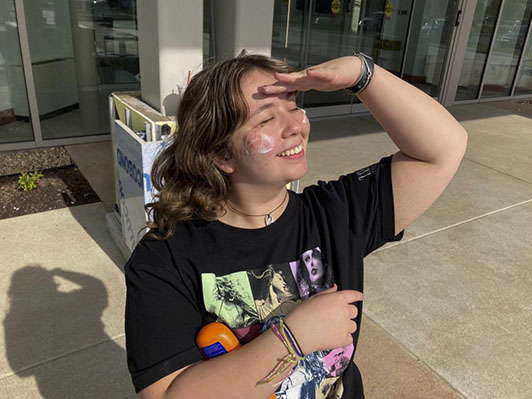A Sunburnt Crisis: The dangers of avoiding sunscreen may be shocking

Sophomore Claire Bergdoll poses in front of the sun with sunscreen applied on her cheeks. Athough she thinks that putting sunscreen on can be a hassle, she still chooses to wear it in spring and summer to help protect her skin from skin cancer, aging, and sunburn.
June 8, 2023
Teenagers nowadays glorify the so-called “beauty” of a tan, thinking it gives them that classic, sought after hot-girl-summer look. To them, tans symbolize summer and youthfulness. In reality though, your skin becoming a darker shade due to sun exposure is really just a sign of skin damage. But due to how desirable a tan is, many teens refuse to wear sunscreen, which in turn can make a “sunburn crisis” much worse than just the peeling on the surface.
Shade or shine, the sun may be more harmful than you may realize. Samantha Durst, a member of the Michael Kurzman MD company in New York, informs that the impacts of a sunburn goes much deeper than the surface of one’s skin.
“You may think the damaging effects of a sunburn go away once the redness fades, but that is not the case. Ultraviolet rays penetrate the skin deep into its layers, where cells can be damaged and even killed,” Durst said. “The long term effects of a sunburn won’t just leave you with wrinkles but also the risk of skin cancer.”
Not wearing sunscreen can cause a variety of cancers. Simply put, being out in the sun can be catastrophic without protection. According to MD Elisabeth Richard from Skin Cancer Foundation, SPF stands for sun protection factor. The number marked next to SPF on sunscreen labels shows how long it takes your bare skin to burn compared to if you use sunscreen. For example, with SPF 30, it will take around 30 times longer to receive a sunburn than without it.
“Regular daily use of SPF 15 sunscreen can reduce your risk of developing squamous cell carcinoma (SCC) by about 40 percent, and lower your melanoma risk by 50 percent,” Richard said. “Men, women and children over 6 months of age should use sunscreen every day. This includes people who tan easily and those who don’t — remember, your skin is damaged by sun exposure over your lifetime, whether or not you burn.”
What if you wear it in the summer? Is that enough? Freshman Erick Hedlund wears sunscreen, but not enough according to Richard.
“I would only wear sunscreen when going to the beach, pool, or spending time outside,” said Hedlund. “I don’t enjoy putting it on that often but I need to.”
Even in the winter months, sunscreen is required on a day-to-day basis to protect the skin from sun damage. While avoiding sun damage can be difficult, altering your routine to incorporate SPF everyday isn’t.
“If you’re inside most of the day with just short intervals in the sun, you can use a sunscreen or cosmetic product with an SPF of 15 or higher,” Richard said. “If you spend a lot of time outdoors, especially when and where the sun is strongest [between 10am to 4pm], you need an SPF 30 or higher, water-resistant sunscreen.”
“If you’re still convinced that skipping out on sunscreen won’t have detrimental effects, consider again the danger of melanoma. According to HealthMatch.com, the cost of treating melanoma can range up to $200,000, depending on the severity. Not only is it costly, but it is noted to be painful as well. Without the use of sunscreen, the painful surgery could be unavoidable.
“Melanoma develops in the cells that produce melanin. It most often develops in areas that have had exposure to the sun, such as your back, legs, arms, and face,” Durst said. “Melanomas can also occur in areas that don’t receive much sun exposure, such as the soles of your feet, palms of your hands and fingernail beds. These hidden melanomas are more common in people with darker skin, which is why you should wear sunscreen everyday no matter your skin type.”
On the contrary of popular belief, SPF is still beneficial to protecting yourself from sun damage regardless of your skin tone. Another concern peers its way through worries of melanoma and other types of cancer: aging. Physically, wrinkling and sunspots can occur more prominently with sun damage meaning there are many reasons to avoid not wearing sunscreen.
“If you have a darker complexion, the melanin in your skin offers some protection from sunburns, but you still need to protect your skin from those harmful ultraviolet rays,” Durst said. “People with fair skin are more likely to develop skin cancer due to sun exposure, but people with darker skin are at risk of more serious kinds of skin cancer.”
Whether you’re convinced or not, there are several types of sunscreens you should consider using that have all been proven to equally control the skin’s sun intake. You may choose a powder, lotion, spray, stick, or skincare product mixed with sunscreen. Powders in general are good for reapplying on the scalp or face, especially if you wear makeup. Skincare mixed with sunscreen is good for extra protection, but shouldn’t be used as your only protection on hot days.
Even though several people say they refuse to wear sunscreen, according to a survey that NHS students took, 77.8% of those wear sunscreen when they’re planning on going outside in the summer. This includes senior Alison Engel.
“I put sunscreen on in the morning as part of my routine when it starts to get warmer and sunnier out, usually in April or May. I also keep a sunscreen stick in my purse to carry with me for reapplication,” Engel said. “I apply once in the morning on my face, hands, and neck, and then if I go outside later and it’s sunny I reapply.
SPF may be the most popular way to prevent sunburns and protect yourself from future consequences down the road. Engel knows that.
“I don’t want skin cancer and would like to keep my skin healthy for as long as I can. I think it’s easy enough [to use] and the benefits outweigh the inconvenience,” Engel said.
Even though sunscreen is a hassle to include in your routine, it can protect your skin from severe long term damage. By the age of 70, one in five Americans will develop skin cancer, while an estimated 90% of aging comes from the time you spend in the sun, according to the Skin Cancer Foundation. Even if a tan seems desirable to you, it won’t seem so luxurious when you end up as an example of that statistic.


